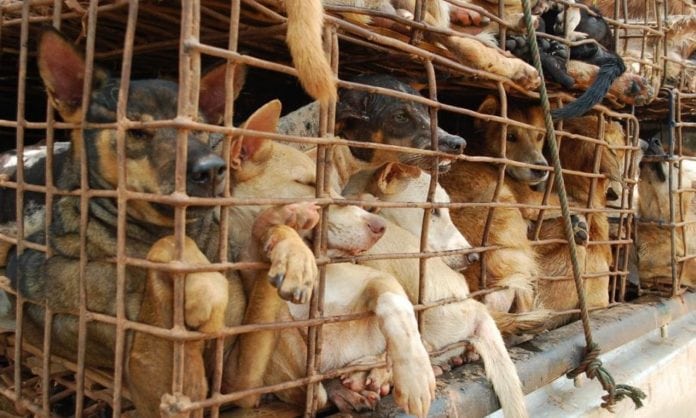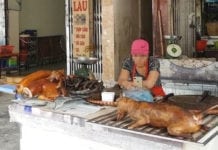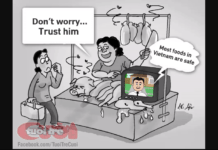The #dogmeat trade in #Vietnam is sparking an increasingly heated debate, both among Vietnamese and in a wider international community.
While the consumption of dog meat doesn’t necessarily denote cruelty to animals, high and rising demand is driving a lucrative but largely unregulated meat market across the country.
Roughly 5 million dogs are slaughtered for human consumption each year in Vietnam, according to the Asia Canine Protection Alliance (ACPA).
In the absence of any animal-rights laws to protect them, traders are free to prioritize profit over humanity – and many do.
“The dog-meat trade is governed by demand,” said John Dalley, co-founder of the Soi Dog Foundation, one of five members of ACPA. “You know, it’s a business. It’s demand, consumption and supply.”
Before selling dogs to restaurants and slaughterhouses, (a Bangkok Jack Report) traders often pump the animals’ stomachs with liquid rice while they are still alive to make them heavier so as to earn more money per kilogram.
The logistics of the trade can be even crueler.
“Nine or 10 dogs are stuffed into a single cage and loaded on to trucks. Legs are hanging out, heads are out, literally over a thousand dogs per truck,” Dalley said.
ACPA advocates for a ban on dog meat on the grounds that legalization would fail to end the abuse or address the health risks associated with the trade, including possible bacterial infections such as anthrax, hepatitis and leptospirosis, or even contraction of rabies.
Regulations
Vietnam has various regulations that apply to parts of the dog-meat industry, but enforcement is weak and easily bypassed, says ACPA coordinator Lola Webber.
“The existing trade in and slaughter of dogs fails to comply with many of the compulsory animal-disease prevention measures,” she said. “In addition, the law requires that animals being imported, transported domestically and exported must be quarantined.”
A key part of ACPA’s work is to encourage the enforcement of these quarantine regulations, in the hope that a costlier and less convenient supply chain will stunt the trade by incentivizing traders to leave it.
“[This] would raise the traders’ costs,” Dalley said. “Their logistics problems would become very difficult – we’re talking thousands of dogs a week, and you’re going to have to keep them somewhere before you can transport them, you’ve got to have them all vaccinated…. If it is enforced then it’s going to put the price of dog meat up.”
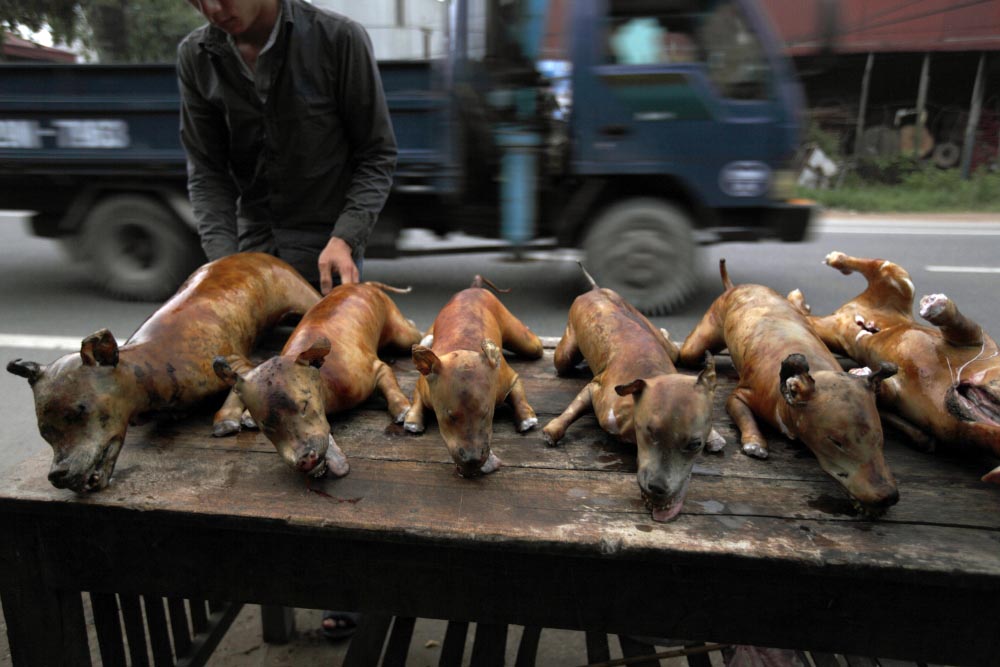
One of the most common and perhaps most dangerous arguments against the dog-meat trade in Vietnam and in wider Asia is that eating dog meat is somehow immoral. In fact, for many Vietnamese eating dog meat is perfectly normal and often considered a delicacy.
Hal Herzog, an expert in anthro-zoology and leading psychology professor, says dog-meat consumption is a matter of culture.
Tasty
“Humans have been eating dogs for a long time,” he told Public Radio International. “It’s quite possible dogs were originally domesticated because they were tasty, but could also do chores.”
Indeed, a tradition of eating dogs has been handed down from generation to generation in Vietnam.
Long, a self-professed dog thief who sells canine meat to traders and middlemen, explained the intricacies of “how to cook a dog” at a meat shop in Ho Chi Minh City’s Tan Binh district. Huge fleshy chunks of dog meat retail for around 90,000 dong (US$4) per kilo at the shop.
“Buy lemon, wine, garlic, chili, galangal, lemongrass and la mo [a Vietnamese herb], chop finely and mix it with the blood of the dog. Put everything inside the guts, tie it into pieces and boil it for around five minutes.
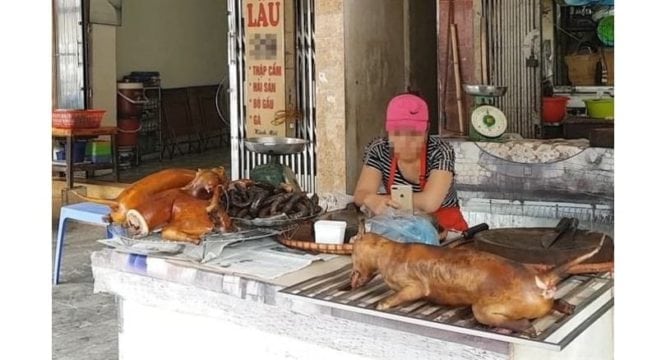
“I can prepare the meat for cooking in just 15 minutes,” he said, a dog under one arm in a green sack. “First you slit the throat quickly and let it bleed out, then boil some water. If a dog weighs 10kg I will prepare 7 liters of water … add some more tepid water and put the dog into the pot.”
In this way, he explained, the fur is easily removed from the animal without cooking the meat. Then the dog chef removes the head, knuckles and internal organs and cleans the meat, preparing it for a range of delicately designed dishes.
While he is technically a career thief, Long doesn’t perceive his work as particularly immoral and is genuinely passionate about dog meat. “I have been doing this for over 30 years. My father did it before me, my grandfather before him.”
Exotic
As Vietnam becomes wealthier, dog consumption is becoming more mainstream. Dog meat was once considered quite exotic, but is now far more accessible, less expensive and increasingly popular with lower-income demographics, according to Tran Gia Bao, Vietnam representative for the Soi Dog Foundation,.
“Dog meat used to be a somewhat special occasion for male workers or friends to gather at the lunar month, but now it’s moved down to a broader market,” said Bao, “like construction workers, laborers and students, and it’s getting cheaper and more street-food style.”
Despite clear links to disease, dog meat has nonetheless gained a reputation among Vietnamese consumers as a widely available, protein-rich, healthy alternative to other meats.
It is also believed to be medicinal, to increase a man’s virility, and to warm the blood in cold weather, and is often associated with cultural superstitions. Most commonly, however, it is viewed as a tasty accompaniment to beer and good company.
Still, attitudes are changing in some quarters. According to a recent VnExpress poll, 95% of respondents agreed the trade should be banned because it is illegal and barbaric.
“You cannot justify boiling, cutting limbs off [and] skinning dogs and cats alive,” said one poll taker. Of the 5% who voted against a dog-meat ban in the poll, many argued for legalization.
“Pushed deeper underground, that black market will simply keep on thriving, and the dog-meat trade will get ever more pernicious for society,” another voter commented.
Technically illegal
Given that parts of the trade are already technically illegal, it is unlikely that regulations would be enforceable if the trade were legalized, ACPA says. For example, although some thieves are arrestedon connected charges, theft as a criminal offense often doesn’t apply to dog thieves.
“Punishment for theft … only applies to the theft of goods that have a value of over 2 million dong,” or $88, said ACPA’s Webber.
Regardless of whether a ban on dog meat would end the trade or not, society’s attitude toward domestic animals could still put them in danger of being traded or abused.
Leopold Vincent, founder of the Vietnam Animals Cruelty shelter, says this attitude may be more related to the notion of ownership than love. “The dog is their property,” he said. “[But] it doesn’t mean that the dog won’t be sold to a restaurant or killed for consumption.”
Families sell their dogs
In fact, it is common for Vietnamese families to sell their dogs to traders as they would livestock, particularly in rural areas.
“If the dog is noisy, if the dog is sick, if the dog is old, they sell it,” he said. “You know, there is the guy on the motorbike with the basket behind and he calls to people, ‘mưa cho đay’” (buy dogs here).
Vietnam’s animal-rights community sees changing social attitudes as key to one day banning the trade.
Paws for Compassion (PFC), a charity based in Da Nang, fights for animal welfare by teaching children more compassion for the animals around them.
The general attitude is “that there are many around, so if the one I have is sick, hurt, or just not as I want it to be, throw it out and get another one,” said one of PFC’s co-founders.
“We fight for animal welfare through education because … we feel that when kids interact with animals at a young age, they learn compassion, and that will cause a ripple effect.”
ACPA employs a similar approach, but with an older target market. While progress is slow and the issue complex, ACPA believes attitudes toward dogs are beginning to change.
“What we’re seeing across Asia actually is a growth in the pet industry,” said ACPA’s Dalley. “You’ve also got young people now, certainly the educated young people, who are far more animal-welfare-conscious.” – AsiaTimes
–
You can follow BangkokJack on Instagram, Twitter & Reddit. Or join the free mailing list (top right)
Please help us continue to bring the REAL NEWS – PayPal
















